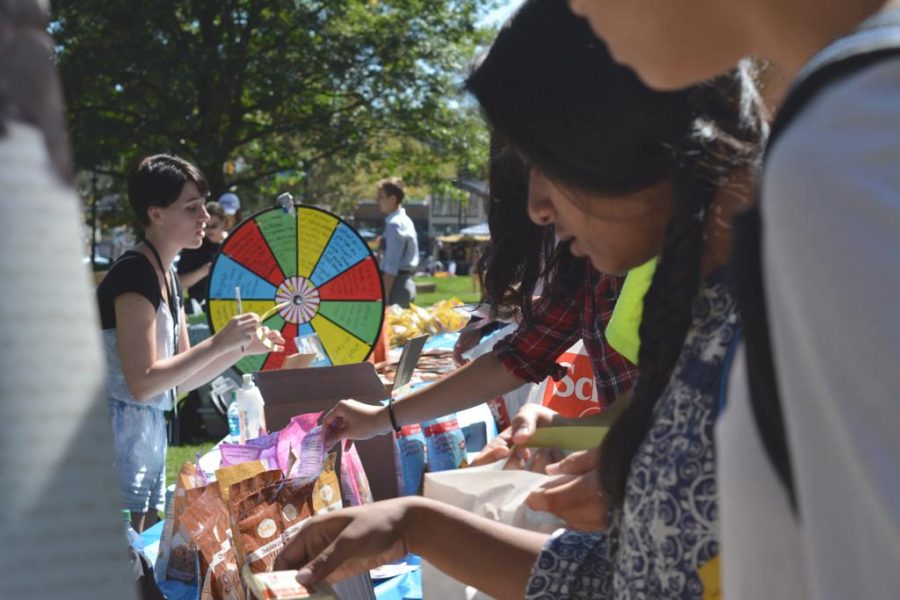Gluten-free foodies rejoiced over plates of celiac-friendly pizza Wednesday on the Union lawn.
The sun shone Wednesday afternoon as the fourth annual Gluten-Free Awareness Carnival united Pitt’s gluten-free awareness organizations and local organic food suppliers to share an afternoon of snacks sans gluten. Volunteers gave out samples of donated gluten-free food samples, such as crackers, baked goods and herbal tea bags. Some local food vendors sold food options like donuts and pizza at the fair, which started at 11 a.m and ran until 3 p.m.
“Feel free to get as many crackers as you want,” Natalie Martin, a Pitt freshman who volunteered at the Carnival, said, as she handed out bags of multi-seed crackers. “We still have two more boxes. Get some for your dad, your mom and your grandparents.”
Participants could win free food by spinning a colorful prize wheel at the Gluten Free Awareness League’s table and answering questions like, “What is gluten?” “Is there a cure for celiac disease?” and “Roughly how many Americans have celiac disease?”
GFAL organized the event over four months of planning efforts. On Wednesday at around 12:30 p.m, club members were handing out gluten-free cuisine as the long line of students waiting for food extended beyond the patio.
Elizabeth Dierkes, the president of GFAL, said the turnout for past gluten-free events at Pitt has been in the thousands. This year, she said, about 1,200 people stopped by throughout the day.
“People come here for free food,” Dierkes said. “For us, it is the perfect opportunity to educate students on gluten-free lifestyle.”
League members patiently explained to participants all the fundamental questions about gluten and celiac disease. Gluten is a protein found in wheat, barley, rye and certain kinds of oats. Celiac disease is a genetic, autoimmune disease. People who have celiac disease cannot digest gluten — when gluten is, their small intestines get damaged, which obstructs the natural absorption of other nutrients. They often suffer from food poisoning .
Mark Dinga, a registered diagnostician at UPMC, was at the carnival to support the GFAL as a medical expert. Dinga urged students to pay attention to the many telltale signs of celiac diseases, such as abdominal bloating and pain, and to get tested if necessary.
According to National Foundation for Celiac Awareness, an estimated one in 133 Americans — or about 1 percent of the population — has celiac disease.
“That’s a very high number. Many people here have celiac disease. And sometimes they are not aware of it,” Dinga said as he scanned the Bigelow Patio and Lawn.
Dinga said although some undiagnosed patients of celiac disease might not display symptoms, an individual’s body can still generate excessive antibodies caused by the consumption of gluten. The extra antibodies, in turn, can damage that person’s internal organs. Continuing to allow gluten in their system could pose a long-term threat to their health.
In order to stay healthy, celiac disease sufferers have to give up gluten — that means saying goodbye to traditional, gluten-filledsandwiches, pizza, pasta and many other neccesities of an American diet.
Besides turning down the goodies, Dierkes said celiac patients also have to battle with a social stigma and fear of burdening others.
“Imagine going to a birthday party as a kid where everyone is eating something at the party and you are the special one who has to bring your little gluten-free lunchbox,” Dierkes said.
However, Dierkes said big changes start with small steps. She said as our society learns more about celiac disease, we can learn how to respect people who suffer from it.
GFAL has been helping Pitt make the campus more celiac-friendly by stocking Pitt’s dining facilities with gluten-free options, like those in Market Central’s gluten-free station.
GFAL’s next initiative is equipping Pitt’s dining halls with gluten-free cookware and kitchen utensils so food workers can prevent cross-contamination.
Living the gluten-free life isn’t always as easy as swapping one snack for another — it can be expensive.
Jeanette Harris, the owner of the Gluten Free Goat Bakery at the Strip District, was selling her apple cider donuts for $3 each at the Carnival and said she was still barely turning any profit. Harris said it is hard to keep the price down because her supplies are often a lot more expensive than non-gluten free supplies.
On the other hand, Haris said some sellers “wildly inflate” the prices of their gluten-free products.
“The big companies manufacture things [of which] the main ingredients are sugar and tapioca starch, and they will charge you a lot of money for it,” Harris said.
But Harris remained optimistic the price would eventually normalize and more varieties of products would become available.
“When I was an undergrad at Pitt nine years ago, there was only one sort of gluten-free bread at a specialty store and it was $7 a loaf. And [the flavor] was terrible,” Harris said.
After being gluten-free for more than a decade, Harris said the best way for college students to afford the gluten-free lifestyle is to cook more at home. At the carnival, vendors also offered plenty of cookbooks as prizes for participants.
For all of the fun and food at the carnival, Dierkes was adamant: Gluten-free is not a fad.
“Some people think that we’re just going after a fad to lose weight or whatever,” Dierkes said. “No, some people actually need it. We often overlook the severity of celiac disease. It affects every area of our life, and it is important for our society to know that.”


